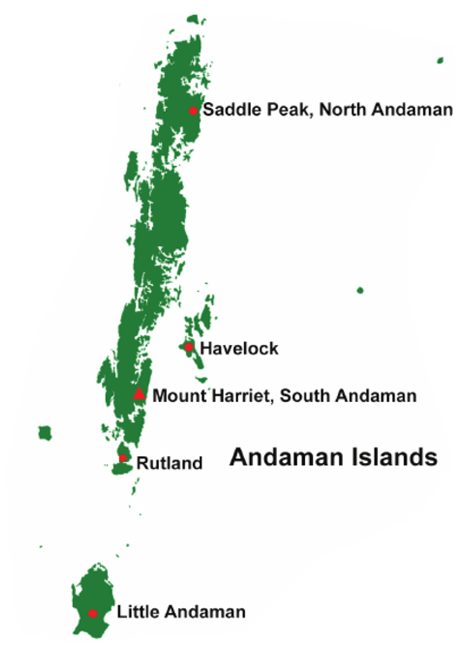Indian History
Mount Manipur and Anglo-Manipur War
- 21 Oct 2021
- 3 min read
Why in News
Recently, the Union government has renamed Mount Harriet of Andaman and Nicobar (A&N) Islands to Mount Manipur.
Key Points
- About:
- Mount Harriet, the third-highest island peak in A&N Islands, where Manipur’s Maharaja Kulchandra Singh and 22 other freedom fighters were imprisoned during the Anglo-Manipuri war (1891).
- It has been renamed in a tribute to those freedom fighters of Manipur.
- Manipur celebrates Khongjom Day on 23rd April in commemoration of the freedom fighters of Anglo-Manipuri War.
- Anglo-Manipuri War:
- Background:
- In 1886, when Surchandra inherited the throne from his father Chandrakirti Singh, the kingdom of Manipur was not under British rule but had links with the crown through different treaties.
- However, Surchandra's ascension to the throne was controversial and his younger brothers - Kulachadra, Tikendrajit - revolted against him.
- The 1890 coup by the rebel faction removed Surchandra, and proclaimed Kulachandra, the next oldest brother, the king. Surchandra fled to Calcutta seeking British help to reinstate him.
- British Imposition:
- The British dispatched James Quinton, the Chief Commissioner of Assam, with an army to Manipur. His mission was to recognise Kulachandra as the king under the condition that they be allowed to arrest the coup leader Crown Prince Tikendrajit and deport him from Manipur.
- This aggressive imposition of British law in a sovereign state was rejected by the king, precipitating the Anglo-Manipuri War of 1891.
- Culmination:
- In the first phase of the war, the British surrendered and their officers - including Quinton - were executed in public.
- In the second phase, the British attacked Manipur from three sides, and finally captured the Kangla Fort in Imphal.
- Prince Tikendrajit and four others were hanged by the British, while Kulachandra, along with 22 others, were deported to the Andaman Islands.
- Despite their victory, it had led to the death of five important officers.
- In India, it was viewed as being part of the general uprising against British rule in the country, soon after the Revolt of 1857.
- The war led to Manipur officially becoming a princely state under the indirect rule of the British crown.
- Background:





